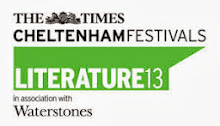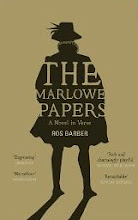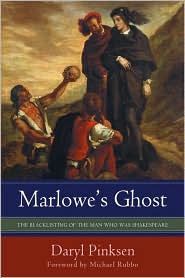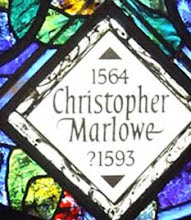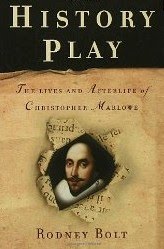As all scholars who have studied Christopher Marlowe’s life and troubles know, the Note delivered by the informer Richard Baines to the authorities sometime in May 1593 contained eighteen accusations of which all but two referred to rather colourful heretical opinions, allegedly manifested by Marlowe in public. The two exceptions accused Marlowe of saying that 1): he had as good right to Coin as the Queen of England; and 2): that they that love not Tobacco and Boies are fools.
We have no way of knowing whether Marlowe had ever said any such things, but his alleged plans for coining, denounced by Baines and investigated in January 1592, must have been nonsense, because Kit was not punished for it. As for charges of immoral behaviour, they seem to have been standard procedure in famous prosecutions for “heresy” in all times and all religions, so those Boies were probably nonsense as well.
But, while the world is prepared to accept that Marlowe was no forger of coins, the Boies have stuck. In the not-so-distant past, when homosexuality was a crime punishable by imprisonment, Baines's accusation went a long way to destroy Marlowe’s reputation; in these days when “gay” is “cool," some scholars seem to think that arguing against Marlowe’s alleged homosexuality is a sign of old-fashioned morality.
I am personally not interested in Marlowe’s sexual proclivities except as they are relevant to my investigation of his life and work. Trying to “read” his real meaning in some apparently equivocal texts may be a way to obtain valuable information about what was happening to him. So, yes, I think it is important to find out whether Marlowe, alias Shake-speare, was gay or not, regardless of moral fashions.
Both Tamburlaine and Faustus, the two Marlovian characters with whom Kit was identified by his contemporaries, were heterosexual. However, after his name had been vilified to suit political interests, his sexuality was scrutinized on the basis of Baines's Note and on the fact that he had presented homosexual characters on the stage.
Meanwhile Stratfordians have managed to look at their man’s plays and sonnets, without feeling the need to declare their author to be gay. As I believe that Marlowe wrote the Shakespearian Canon, I have looked at those works for further information.
Marlowe wrote about gods and kings falling for good-looking boys. Likewise, there are a couple of Shakespearian characters, both of whom are called Antonio, who fall for younger men. As I suspect that Marlowe was an agent of the Earl of Essex between 1593 and 1599, and as the homosexual Bacon brothers were also working for the Earl during those years, it may be that these two Antonios refer to Anthony Bacon.
Let's have a look at the two characters.
- Twelfth Night: A kind sailor named Antonio rescues Viola’s twin brother, Sebastian, from a shipwreck. Antonio becomes infatuated with the boy and recklessly gives him his purse so he may spend freely while he, Antonio, goes about his business. Sebastian is certainly not gay; he is grateful to Antonio for his kindness but he falls in love with Olivia and marries her before the end of the play.
- The Merchant of Venice: The relationship between another infatuated Antonio and the heterosexual Bassanio is practically the same. Foolishly, Antonio will place his life at risk in order to give to Bassanio the money he wants to woo Portia. Bassanio is very fond of Antonio, but he is in love with the girl and will marry her. In the source story, Il Pecorone, by Giovanni Fiorentino, (1558), the names are different and the doting benefactor is presented clearly as a “father” figure.
Although I found a Bassani family in Padua, one of whose members was called Antonio Bassanio of all things, the name Bassanio might derive from the basanite stone or lapis lydius, which, like the touchstone, serves to identify precious metals. (For definitions of these stones, see footnote, below).
This possible interpretation would fit with the name given in The Merchant of Venice to the young man who manages to choose the valuable metal casket despite misleading clues. As the name of Touchstone in As You Like It is one of the clearer references to Marlowe in the Canon, we might be justified in surmising that Bassanio/ Touchstone may be a reference to Marlowe as well.
At the risk of sounding frivolous, since my information is based on the unreliable Internet, I cannot resist passing on a curious anecdote: In the same article, where the basanite or lapis lydius is described as “A black flinty jasper used for estimating the purity of precious metal alloys" (so a good name for Bassanio), we are told not to confuse the basanite with the bassanite, which is “a saline evaporite, consisting of calcium sulphate, found at Vesuvius." And here the plot thickens because, in the same entry, we are alerted to the fact that the anagram of bassanite is Sebastian.
I leave it to my readers to decide what kind of spooky coincidence is this. That said, if the bassanite (as opposed to the basanite), was only discovered and given its name in the 20th Century (see footnote), we need to forget the bassanite altogether in this exercise and assume either that the basanite was spelt in the usual random way of those days, or that both the Sebastian anagram and the name Bassanio, with its double s, are a complete fluke. Quite frankly, I dare not express an opinion on the matter.
But whatever we think of the names, we have here the repeated pattern of a kind, homosexual man helping a boy whom he evidently fancies, and providing him with money; this boy who is in some sort of trouble, accepts the help and the money but he clearly likes women.
Then we have Sonnet 20, with what seem to me clues in the same direction. My choice of Anthony Bacon for the role (he was eight years older than Marlowe) is based in the known fact that he was a homosexual and that, if indeed Marlowe was Essex’ agent, Anthony, acting on behalf of their mutual boss, would have provided him with money, papers and general “help” in his secret life. Marlowe would have been grateful for all this kindness, which may explain not only the sonnet, but also the friendly outcome of the difficult relationship between the boys and their Antonios in both plays.
Here is Sonnet 20:
A woman's face with nature's own hand painted,
Hast thou the master mistress of my passion,
A woman's gentle heart but not acquainted
With shifting change as is false women's fashion,
An eye more bright than theirs, less false in rolling:
Gilding the object whereupon it gazeth,
A man in hue all hues in his controlling,
Which steals men's eyes and women's souls amazeth.
And for a woman wert thou first created,
Till nature as she wrought thee fell a-doting,
And by addition me of thee defeated,
By adding one thing to my purpose nothing.
But since she pricked thee out for women's pleasure,
Mine be thy love and thy love's use their treasure.
This is the kindest rejection of a dear friend’s advances in the history of unrequited love. Here is what I read:
“You are as good-looking and gentle as a woman, and more loyal. In fact, you should have been a woman, but, when she was creating you, Nature lost her head (“fell a-doting”) adding one thing (a phallus) to your wonderful person. By this addition, which is nothing to my purpose, Nature me of thee defeated; in other words, she deprived me of you. As you were provided with a phallus to give women pleasure ("she pricked thee out for women's pleasure"), I will have your love but the use of “it” must be their treasure.”
The word love here must be understood in Elizabethan, not romantic terms. In Sonnet 26 we read:
Lord of my Love, to whom in vassalage, etc.
I think this humbly apologetic sonnet may have been dedicated to Essex but that’s another story; Marlowe may have referred to any of his aristocratic patrons as Lord of my love, simply as a mark of respect and devotion.
(By the way, no earl in his right mind would have offered vassalage to any man under his monarch; the word could never be addressed to an equal. I wonder how Oxfordians explain this sonnet.)
In sum: Bassanio and Sebastian, like the author of Sonnet 20, love their benefactors, but cannot be in love with them. Sonnet 20 is telling us that, despite the beauty and virtues of a dear friend, the male organ held no attractions for Shake-speare.
© Isabel Gortázar, March 2011
Isabel Gortázar is an independent scholar, specializing in Shakespeare and Marlowe studies. She is a member of the Board of Directors of the Marlowe Society (UK) and a founding member of the International Marlowe Society. She divides her time between London and Bilbao, Spain.
who wrote shakespeare's sonnets?emmerich devere
Notes
Touchstone:
a): a black siliceous stone related to flint and formerly used to test the purity of gold and silver by the streak left on the stone when rubbed by the metal.
b): a test or criterion for determining the quality or genuineness of a thing.
Basanite: A black flinty jasper used for estimating the purity of precious metal alloys.
Bassanite: “A saline evaporate consisting of calcium sulphate, found at Vesuvius. First discovered around 1906/ 1910.
The stone was given its name to honor
Francesco Bassani (1853–1916), Professor of Paleontology, University of Naples, Naples, Italy.
Click here for the blog's home page and recent content.THE MARLOWE PAPERS
Wednesday, April 13, 2011
Subscribe to:
Posts (Atom)


